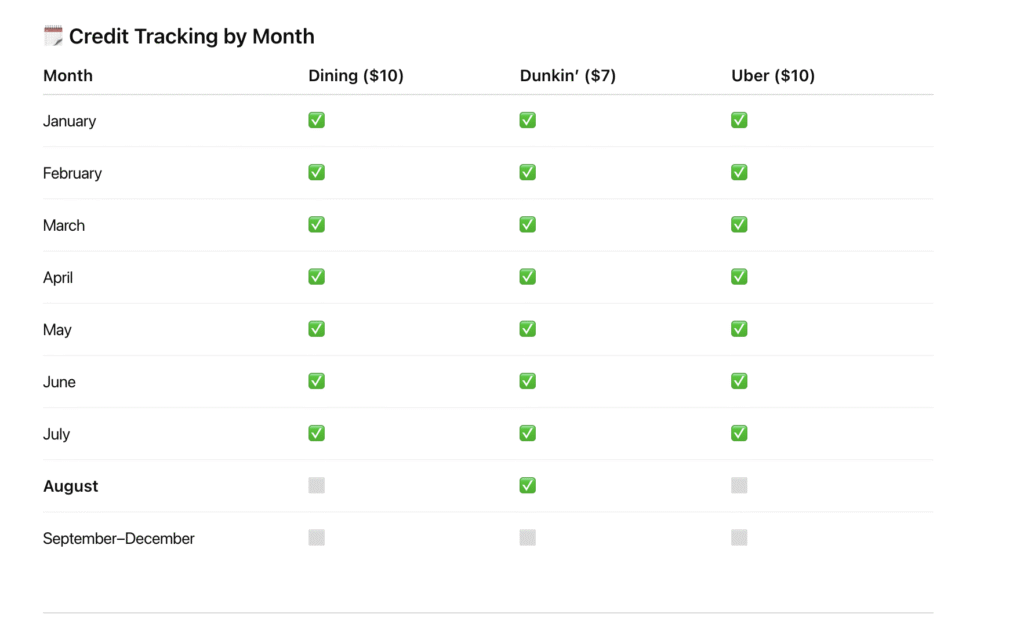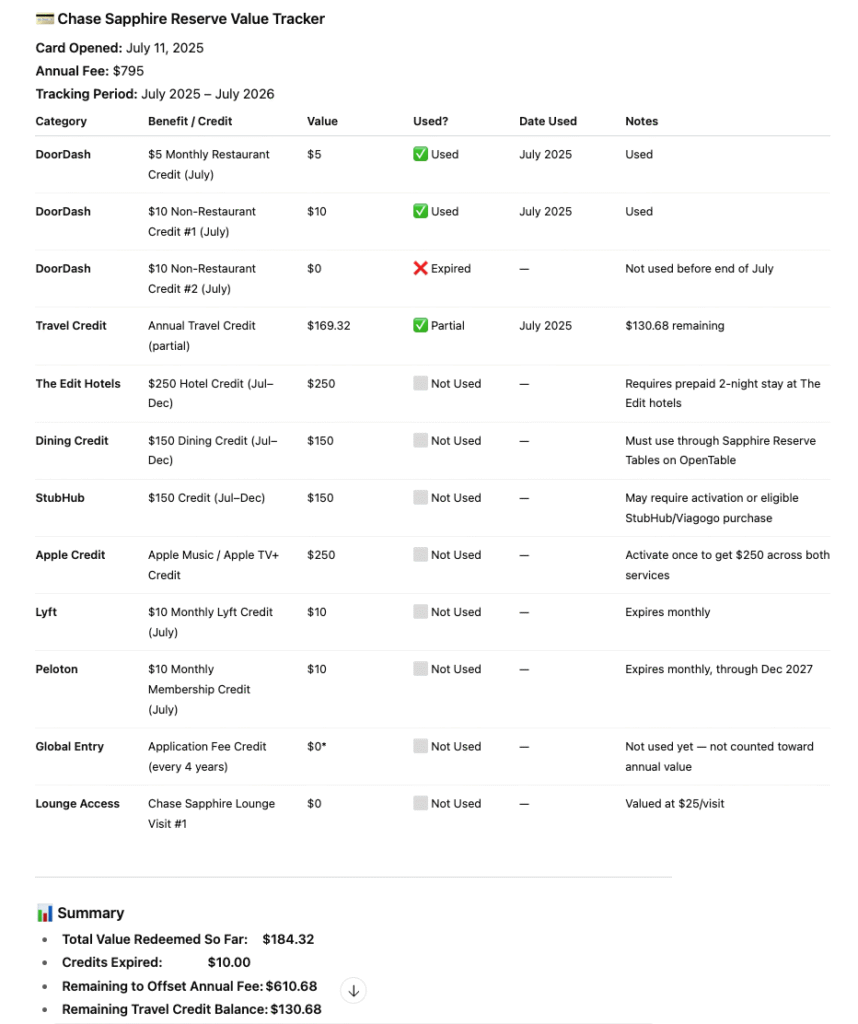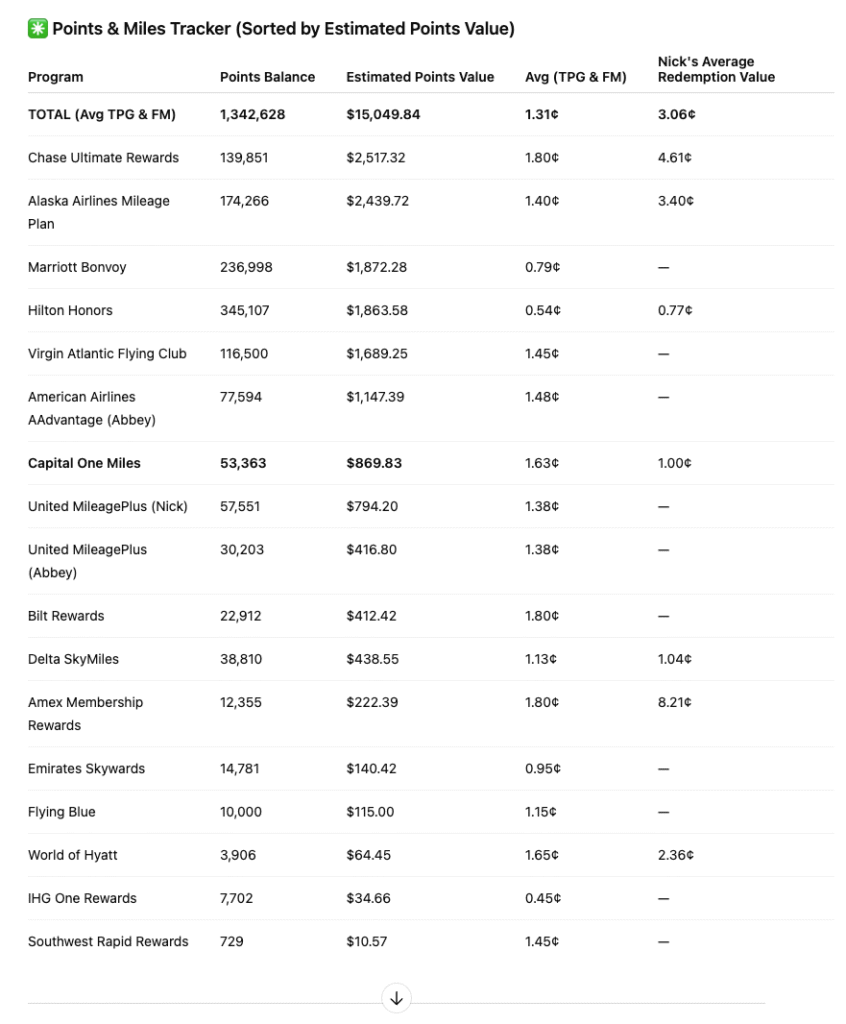If you're like me and have more than a few travel credit cards, you know how quickly things can spiral out of control when it comes to tracking all of the benefits and credits they provide. Annual fees, monthly statement credits, travel perks, free hotel nights, airline fee reimbursements – it's a lot to keep tabs on. And if you're not tracking it all somewhere, you're probably leaving value on the table.
For a long time, I used spreadsheets and calendar reminders to keep track of my benefits. It worked … kind of. But it also got messy and time-consuming quickly. These days, I use ChatGPT to track every benefit I use – and everything I still need to use.
Here's how I'm doing it – and how you can set up a similar system yourself using AI.
Related Reading: We've Had It: Amex Card Credits & Benefits Are Out of Control
- Why It's Worth Tracking Credit Card Benefits
- How I Use ChatGPT as a Credit Card Benefits Tracker
- What Makes This Better Than a Spreadsheet?
- How to Set Up Your Own AI Credit Card Benefit Tracker
- Copy & Paste Prompt: Build Your Own AI Credit Card Benefits Tracker
- Other Ways I am Using AI to Help Manage My Award Travel
Why It's Worth Tracking Credit Card Benefits
Travel credit cards are absolutely worth the ever-rising annual fees … if you're using the benefits. It's why we urge readers to do the math before ruling out credit cards with large annual fees. But the tricky part is remembering to use all the perks you're paying for – and actually tracking what you've used vs. what's left.
Take the *amex gold*, for example. Cardholders have the following benefits that they need to keep tabs on:
- A dining credit of up to $10 a month to use at Grubhub, The Cheesecake Factory, Goldbelly, wine.com, or Five Guys.
- Up to $84 to use at Dunkin' ($10 each month).
- Up to $120 in annual Uber Cash to use for Uber rides or with the Uber Eats food delivery platform ($10 each month).
- Up to $100 to use at restaurants that partner with the reservation platform Resy. You get up to $50 to spend twice each year.
If you're not logging those each month (or so), it's incredibly easy to forget – or just miss one altogether. And like most of these new credit card benefits, they are use it or lose it – they won't rollover to the next month, or half year in the case of the Resy credit.
That's where ChatGPT (or any other AI model) can become your personal benefits assistant. As you can see from the screenshot below, every month when I use one of these credits, I let ChatGPT know, and it keeps a running log of my progress.

This feeds into my master benefit tracker for the Amex Gold card, and as you can see below, I only need to redeem another $17.06 to offset the card's $325 annual fee (see rates & fees). This of course doesn't include the points I am earning by actually spending on the card – though that is something you could surely build into the calculations as well.
How I Use ChatGPT as a Credit Card Benefits Tracker
Every time I use a benefit on one of my cards, I log it with a quick message in ChatGPT: “I used my $10 Amex Gold dining credit for August 2025.”
Or: “I spent $169.32 towards my Chase Sapphire Reserve's annual $300 travel credit.”
From there, ChatGPT keeps a running total and tells me how much value I've received – and what's left to use. It's like having a personal assistant who always knows where I stand with my card's benefits.
Here's what this looks like in practice:
- I can ask “How much have I used of my Amex Gold credits so far this year?” and get a full breakdown.
- Or, “Show me my current progress towards my *chase sapphire reserve* $300 travel credit.”
- I can even assign a realistic value to lounge visits or hotel free night certificates, which helps me calculate whether a card is still worth keeping.
For example, here is the full list of benefits available on my new Chase Sapphire Reserve card. As you can see, I've assigned a value of $25 for every visit to a Chase Sapphire Lounge. I've got a decent amount of work left to recoup my $795 annual fee.
What Makes This Better Than a Spreadsheet?
Spreadsheets are static – they require you to build formulas, maintain rows, and remember to open them. Using AI, this all happens through natural conversation.
The real magic is how flexible it is. For example:
- You can store custom valuations for things like lounge visits, hotel free nights, or points earned on card spending.
- You can ask it questions on the fly, like “Did I already use my quarterly airline credit on the Hilton Aspire Card?”
- You can track cards over time, including anniversary dates, renewal fees, and monthly recurring credits.
The key is consistency: Just tell ChatGPT (or whatever AI model you are using) when you use a benefit, and it'll do the rest. The outputs are only as good as the inputs you give them.
How to Set Up Your Own AI Credit Card Benefit Tracker
You don't need to be a programmer or have extensive experience using AI to do this. Here's how to get started.
- Pick your AI Platform: I use ChatGPT Plus (which costs $20/month). This allows me to customize and store data in an ongoing conversation, but you can do this with any AI model. If you're not ready to commit to the paid plan, you can still save a running “conversation” with ChatGPT in the “chats” section.
- Start a new “project” just for tracking credit card benefits: I have a project called “Credit Card Benefit Tracking,” and within that project, I have a chat dedicated to all of my credit cards that I need help tracking. It works well for me to help keep everything organized.
- Tell it how you want to track your cards: List the cards you have, the benefits you want to track (all of them), your annual fees, and renewal dates.
- Log each benefit as you use it: A quick one-liner is all you need. Remember, the tool will only be good if you are consistent about feeding it the data.
- Assign custom values: I try to assign values to things that don't otherwise have them. For example, as mentioned above, I think a visit to the Chase Sapphire Lounge is reasonably worth $25. I've told ChatGPT that, so every time I visit one, it tracks $25 in value towards the annual fee on my Reserve card.
- Ask it questions anytime: It's really helpful to see what is unused and how much value you've received from a card compared to the annual fee. When it comes time to renew a card, I will have all the data I need to help me make an informed decision on whether or not to renew it for another year.
Want to jump-start your own tracking system? Here’s the exact prompt you can paste into ChatGPT to get an instant, customized benefits tracker.
Copy & Paste Prompt: Build Your Own AI Credit Card Benefits Tracker
Here is the exact prompt you can use to set this up for yourself:
“I want you to create a personalized benefits and credits tracker for my [CARD NAME] that will track all annual, semi-annual, and monthly credits, perks, and rewards against the annual fee so I can see how much value I’ve received and how much is left to break even.
Tracker requirements:
- Table format with columns for: Benefit/Credit Name, Total Value, Used?, Date Used, and Notes.
- Running totals showing: total value redeemed so far, credits expired, and remaining value needed to offset the annual fee.
- Track recurring monthly/semi-annual/annual perks and one-time benefits.
- Mark unused credits as expired if they pass without use.
- Assign custom values for perks like lounge visits or free night certificates.
- Track partial credits (e.g. $300 travel credit) and show the remaining balance.
- When I update you (e.g., “I used my $10 dining credit in August”), update the tracker, recalculate totals, and carry those changes forward.
- Remove or adjust benefits I won’t use to reflect the accurate max value.
Card details to start with:
- Card Name: [ENTER NAME]
- Annual Fee: $[ENTER AMOUNT]
- Tracking Period: [ENTER DATES]
- Benefits & Credits: [LIST EACH BENEFIT, VALUE, AND FREQUENCY]
- Custom Valuations: [LIST IF APPLICABLE]
Keep this tracker in the same chat so I can update it over time, and you can maintain a running history.”
Other Ways I am Using AI to Help Manage My Award Travel
When it comes to using AI to stay organized, the possibilities are endless. Another use case I have found helpful is using ChatGPT to keep a running total of all my points and miles balances. It took a little bit of effort to get everything logged, but now, all I need to do is tell it when one of my points balances has changed, and it does all the rest.
I am also using a blended average points valuation from both The Points Guy's Points & Miles valuations and Frequent Miler's Reasonable Redemption Values (RRVs). This allows me to have a baseline of what my points and miles are actually worth. Whenever I make a redemption of my own points, I feed it to ChatGPT, and it calculates the last column, “Nick's Average Redemption Value.”
I've only had this set up for about a month, but I have found it really helpful to know where all of my points and miles are and how much they are worth.
Bottom Line
This is next-level credit card optimization, and once you've set it all up, it's very easy to maintain. Using AI to track credit card benefits ensures I am squeezing every last dollar out of my cards and never forgetting a perk again. It also makes it very easy for me to see whether or not I am getting enough value out of an annual fee to renew the card.
It's like having a spreadsheet that talks back – and it's made my entire wallet strategy smarter.










I definitely don’t want ChatGPT to know all of that info about me, but it sounds very useful.
Great article except I wish you had listed out a prompt. For example, to track my CSR, this is what I put into ChatGPT as a prompt.
Thanks for reading! I have updated the article with the exact prompt you can use to get this set up.
Hey TT,
To quote another article from the email you just linked this article in as well: Just because you can doesn’t mean you should.
AI’s incredibly energy intensive and harmful to the environment. I get it. It’s all the rage. There are advents for its use in my field of work too.
Just because you can put 500 mystery dishes in an oven and serve the one that looks most like a steak doesn’t mean that it’s ethical to waste the energy to make the other 499.
Nick – I assume to use this effectively, you would suggest the paid model? Would the free plan work? Sorry, but haven’t used Chat GPT so I’m a novice. Thank!
Hi Ben! Yea the paid model will work best. That said, I use it for a lot of things and I don’t think I would buy it just for this use case. But the free version should work decently well. You likely will just have to keep everything in one running chat.
Thanks Nick!
This is genius…I just set my system up.
Thanks!
Wow this is fantastic! Would you be able to share the exact prompts you used to set this up?
Nothing fancy. I just provided ChatGPT with a full list of the card benefits for each of the cards I want to track, when my annual fee is due, the annual fee and tell it that I want to start tracking benefits I am using to recoup my annual fee. From there, it will do the rest. Thanks for reading!
have you tried using ChatGPT to determine what all the benefits of the different cards are? I find myself having to log onto each credit card and looking at the benefits to keep them straight. I suppose once I had a spreadsheet set up it would do that, but I want to simplify that process if possible.
Yes
Hmm have you tried using something like Kudos – when I tried it last, it does all this automatically by pulling from your credit card statement and it knows common benefits for major credit cards
I am not familiar with Kudos, but it sounds like what I am looking for. something that knows what the benefits are for each of my CCs.